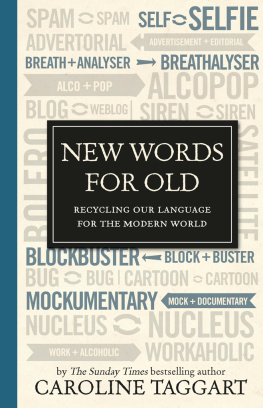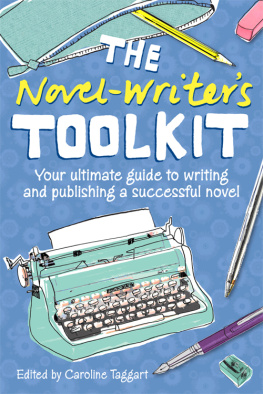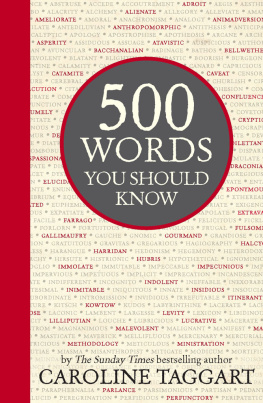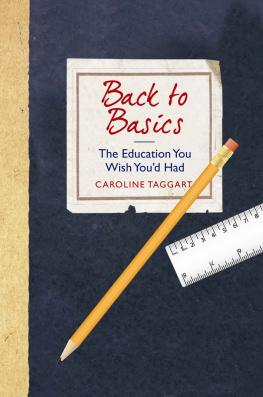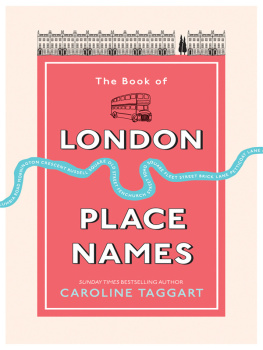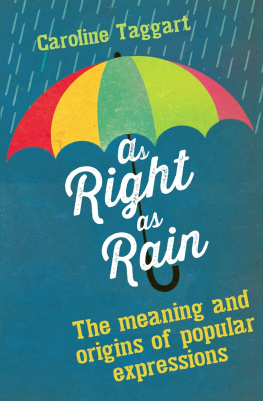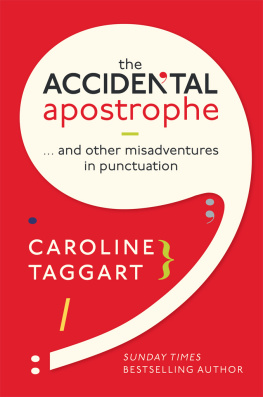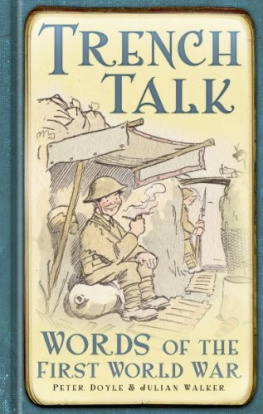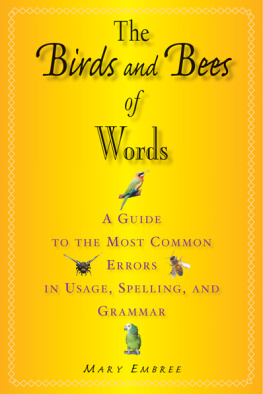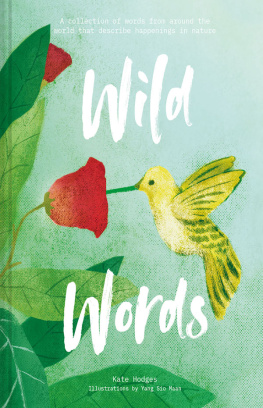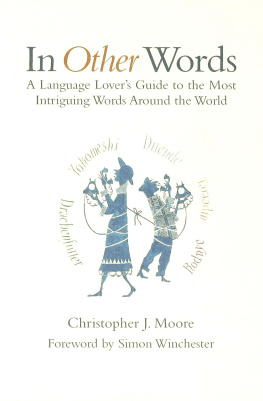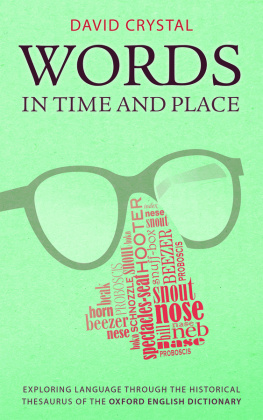By the same author:
I Used to Know That
My Grammar and I (or should that be Me?)
A Classical Education
An Apple a Day
Answers to Rhetorical Questions
Pushing the Envelope
The I Used to Know That Activity Book
Back to Basics
As Right as Rain
500 Words You Should Know
First published in Great Britain in 2015 by
Michael OMara Books Limited
9 Lion Yard
Tremadoc Road
London SW4 7NQ
Copyright Caroline Taggart 2015
All rights reserved. You may not copy, store, distribute, transmit, reproduce or otherwise make available this publication (or any part of it) in any form, or by any means (electronic, digital, optical, mechanical, photocopying, recording or otherwise), without the prior written permission of the publisher. Any person who does any unauthorized act in relation to this publication may be liable to criminal prosecution and civil claims for damages.
A CIP catalogue record for this book is available from the British Library.
ISBN: 978-1-78243-472-6 in hardback print format
ISBN: 978-1-78243-473-3 in e-book format
Designed and typeset by K.DESIGN, Winscombe, Somerset
www.mombooks.com
Contents
The English language is a versatile thing, and we users of it can be agile too. When we invent new things, we are pretty good at coming up with names for them. Aspirin, television, dot-com company there was a time when these things didnt exist, so there wasnt a word for them. There is now.
But sometimes when the need for a new word comes along we choose not to make one up; we simply adapt the meaning of an existing one, or put two together to form a third.
Modern life is full of such words, and that is what this book is about. It traces the development of ). This sort of word, by the way, is called a portmanteau, an invention of Lewis Carrolls to describe a term that has two meanings packed into one.
The words discussed here arent fancy ones that will improve your vocabulary and impress your friends Id be surprised if there were more than a handful that you dont use every day (though I have to confess that , whose purpose was once to keep people isolated, now enables you to keep in touch wherever you go.
Much of this book is about technology, an area that has developed and continues to develop so rapidly that it is in constant need of new vocabulary. for hundreds, sometimes thousands of years. They were just different discs, domains, forums and hardware. In the future, words like this will almost certainly be adapted again and again to deal with advances as yet undreamed of.
That may sound like a daunting prospect, but I have no doubt that the English language will be able to cope. We have the old words we just sometimes need to dust them off, polish them up and send them out with a clean handkerchief in their pockets, ready to face a bright new day.
Caroline Taggart
London, May 2015

One of the main areas in which weve adopted words in the last hundred years or so is the entertainment business. This chapter looks at photography, the cinema, radio and television, but also at games, reading material and for the benefit of those who see it as a leisure activity shopping.
acoustic
As a branch of physics concerned with sound, acoustics dates back as far as the seventeenth century, when a record of the proceedings of the Royal Society proposed the existence of three types of hearing direct, refracted and reflected, or, more technically, acoustics, diacoustics and catacoustics. It seems a shame that neither of the last two passed into common use: a lot of fun could surely have been had and a lot of silly photos posted on Twitter from a misunderstanding of catacoustics.
No matter. Acoustics did catch on, both as a science and as a description of the way sound was transmitted in a building, particularly a concert hall. Early sound recordings were made acoustically that is, using sound waves, which were collected in a horn and channelled towards a thin diaphragm, causing it to vibrate. These vibrations drove a stylus that recorded the sound on a wax cylinder or .
This method was superseded in the 1920s by electric recording using a microphone. Then in due course came the 1950s and the Fender Stratocaster not the first electric guitar, but the one that really made the idea take off. As electrical instruments became the norm in in use for centuries came to be called an acoustic guitar one that relied on sound waves rather than electricity.
Much the same was true of pianos and various other instruments. The process is comparable to what is now happening with reading: the object that for hundreds of years we have called simply a book now needs to be designated a print book in order to distinguish it from the increasingly popular e-variety.

advertorial
A combination of advertisement and editorial, used to mean an advertisement feature presented as if it were a factual report, this modern-sounding word has in fact been around for a hundred years. It is found in 1918 in the works of the British publicist and author Charles Higham, who established the advertising agency that bore his name, and from the context its clear that the concept, if not the term, had been known in the fledgling insurance companies that grew up in the London coffee houses of the seventeenth century.
A present-day New Zealand website advising on how to write a good advertorial suggests that you should use simple, everyday language and avoid slogans such as Youve tried the rest, now try the best; that you should tell a story rather than just fill the piece with facts; and that, although you should include your contact details, you shouldnt mention a price, as This tips the story too much towards the advertisement end of the scale. Im inclined to think that most readers know an advertisement when they read it and, if they dont, the words advertisement feature, which invariably heads the page, may give them a clue.

album
The Latin albus means white and the neuter form album was used as a noun to describe a blank tablet, something on which you could write whatever you wanted. The sense of a blank book in which you or your friends could write messages or mementoes had emerged in English by the seventeenth century and the photograph album followed as soon as photography was sufficiently widespread for the expression to be needed. Thus the derivation of the word was obscured: the important thing about an album came to be not that it had started out as blank, but that it enabled you to build up a collection.
changed, a single CD or download.

biopic
A biographical picture, with picture here meaning motion picture or movie, the biopic differs from the docudrama in that it tells the whole story of someones life, rather than focusing on a particular incident. The concept is as old as cinema itself the pioneering French film-maker Georges Mlis made a short biography of Joan of Arc in 1900. However, the website filmreference.com tells us that the biopic emerged as a recognizable subgenre in the 1930s and that the first is generally considered to be the 1929 film
Next page
